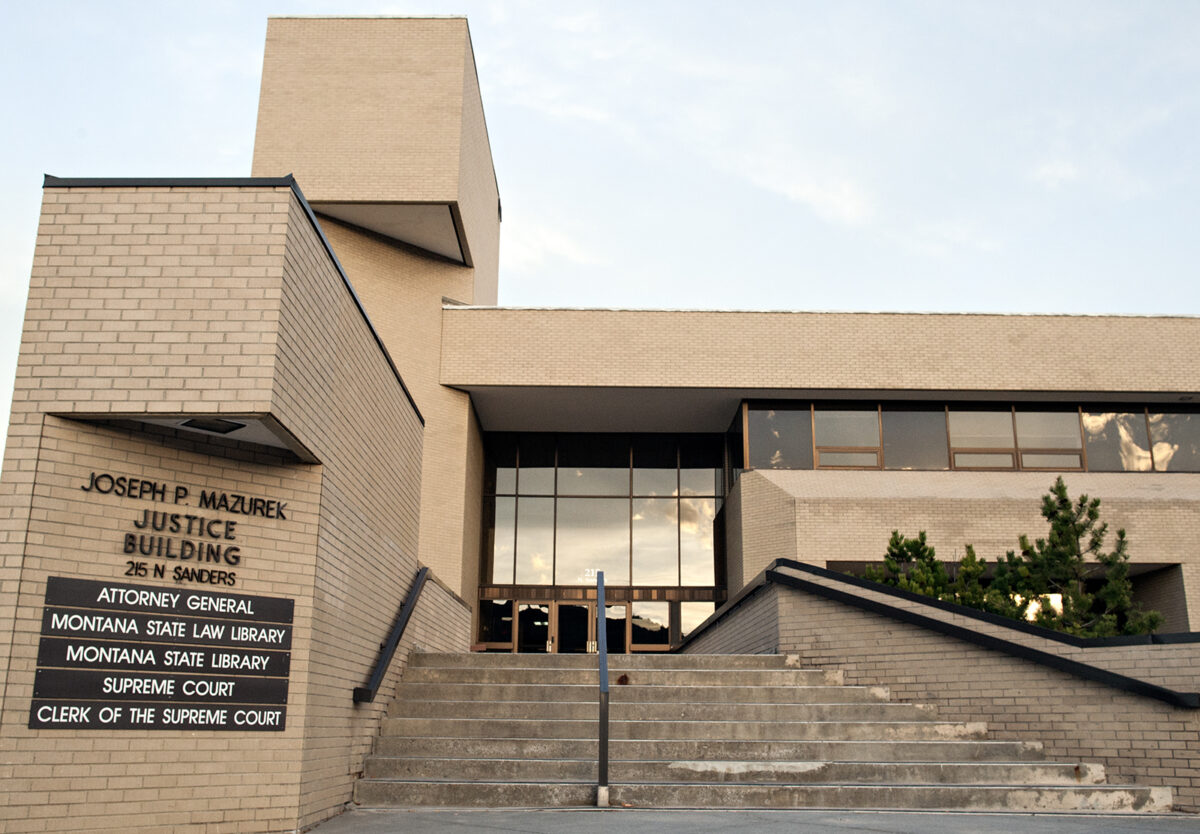Flathead Republicans Figure Prominently as GOP Aims to Curb Judicial Power
A bill that would allow political parties to make contributions to judicial candidates — carried by Marion Republican Rep. Tom Millett — passed the House on Tuesday. It's one of many GOP-backed bills designed to rein in the power of the state's courts.
By Denali Sagner
As Montana’s 69th legislative session gets underway, Republican lawmakers are leading a charge to curb the power of the state’s judiciary, a powerful branch of government that they say has subverted the will of the people by striking down GOP-backed laws in recent years.
The state House on Tuesday passed a bill allowing political parties to make contributions to judicial campaigns, which have long been nonpartisan in Montana. The bill, which was carried by freshman Rep. Tom Millett, R-Marion, at the request of the Senate Select Committee on Judicial Oversight and Reform, passed on a party line vote.
During a House Judiciary Committee hearing on the bill last week, Millett said, “While some argue that judges should be free from political influence, the reality is politics has always played a role in the judiciary, whether in the selection process or in the legal outcomes that shape our society.”
The lawmaker described the bill as “an opportunity to enhance the transparency, accountability and public trust in the judiciary.”
Disdain for the Supreme Court has become a pillar of Montana’s modern Republican Party, which has secured overwhelming political power in the past two decades yet has been hamstrung by court decisions ruling pieces of their hallmark legislation unconstitutional.
The Montana Supreme Court has blocked Republican laws that restrict voter registration, require parental consent for abortions and define sex as binary. Most recently, the court upheld a landmark lower court ruling that the state had violated residents’ right to a clean environment by permitting natural gas projects without regard for climate change.
Following the climate case ruling, Senate President Matt Regier, R-Kalispell, released a statement saying, “The Montana Supreme Court turned the courtroom into a legislative policy committee, drastically overstepping its constitutional boundaries into the Legislature’s role and violating the separation of powers. Montanans will continue to suffer decades of economic and social harm if we don’t turn our activist and overreaching courts around.”
Gov. Greg Gianforte during his State of the State address on Monday criticized what he described as liberal-leaning courts and accused “extreme-left, dark-money groups who devise clever names to hide their intent” of working to elect favorable judges.
Discussing a 2023 law passed by the Legislature, but blocked by the courts, that would have defined sex as binary in state law, the governor said, “The sex one is born with is an unchangeable, biological fact. Some courts, including our own, haven’t grasped that simple fact. These are all commonsense laws, designed to protect Montana children, but far-left lawyers challenged all of them. And our courts? Well, they’ve sided with the far left, either tying the laws up or tossing them out.”
In response to the growing pile of court rulings which blocked or struck down GOP-supported legislation, Republicans last spring formed the Senate Select Committee on Judicial Oversight and Reform, which they charged with reigning in the court’s “abuse of power” and restoring “coequal power among the three branches of government.”
The committee, which met 12 times in 2024, delivered 27 proposals last month, including legislation that would allow political parties to contribute to judicial elections, audit the Montana Bar Association and allow for partisan elections of judges and justices.
The five Democrats appointed to the 15-member committee refused to participate in any of its meetings, calling it “political theater.”

Republicans from the Flathead Valley are figuring prominently as the Judicial Oversight Committee’s proposals move through the Legislature.
Committee members included Republican Sens. Carl Glimm of Kila and Mark Noland of Bigfork. Whitefish attorney Jim Ramlow, who is a fellow at the conservative Frontier Institute, served as a nonvoting member.
The powerful House Judiciary Committee, through which bills pertaining to the courts often move, is chaired by Rep. Amy Regier, R-Kalispell. Flathead Valley Republican Reps. Steven Kelly, Tom Millett, Braxton Mitchell and Tracy Sharp also serve on the committee.
Glimm, the senator from Kila, on Wednesday morning presented a bill to the Senate Judiciary Committee that would revise the code governing the Judicial Standards Commission, a five-member state body tasked with investigating grievances of misconduct or unethical conduct against judges in Montana.
Bigfork senator Noland is set to carry a bill allowing an individual legislative committee, rather than the entire House or Senate, to hold in contempt a witness who does not comply with a legislative subpoena.
Sen. John Fuller, R-Kalispell, last month penned a letter to the president of the Montana Bar Association, criticizing the bar for its “implicit endorsement of partisan attacks on the Republican Party and elected Republican officials” following a bar-sponsored panel last year during which attorney Jim Goetz called a Montana Supreme Court decision “a piece of s–t” and said that laws recently enacted by Republicans were “just pieces of garbage…[that] should be stricken.”
Fuller is now carrying a bill to make membership in the state bar voluntary. Currently, all attorneys in Montana must be licensed by the bar.
Democrats have characterized Republican efforts to reshape the judicial branch as attacks on the Democratic process.
In a statement following the formation of the Judicial Oversight Committee last spring, former House Minority Leader Kim Abbott called the committee a “move by Republican Senate ‘leadership’ [that] is just a temper tantrum from lawmakers who can’t face the fact that the courts are not the problem — it’s them and their unconstitutional legislation,” the Montana Free Press reported.